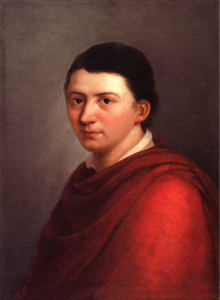The traveller
(Poet's title: Der Wanderer)
Set by Schubert:
D 649
[February 1819]
Part of Schlegel: Abendröte (putative cycle)
Wie deutlich des Mondes Licht
Zu mir spricht,
Mich beseelend zu der Reise:
“Folge treu dem alten Gleise,
Wähle keine Heimat nicht.
Ew’ge Plage
Bringen sonst die schweren Tage.
Fort zu andern
Sollst du wechseln, sollst du wandern,
Leicht entfliehend jeder Klage.”
Sanfte Ebb’ und hohe Flut
Tief im Mut,
Wandr’ ich so im Dunkeln weiter;
Steige mutig, singe heiter,
Und die Welt erscheint mir gut.
Alles Reine
Seh ich mild im Wiederscheine,
Nichts verworren
In des Tages Glut verdorren:
Froh umgeben, doch alleine.
How clearly the moonlight
Is speaking to me,
Inspiring me on my journey:
“Follow the old track faithfully,
Do not choose any homeland.
Eternal torment
Would come along with the heavy days otherwise.
Onwards towards others
Is how you should change, is how you should travel,
Escaping lightly from every complaint.”
Gentle ebb and high floods,
Deep in courage,
This is how I travel on in the darkness,
I climb courageously, I sing cheerfully,
And the world appears to me to be good.
All that is pure
I see gently in the reflection,
Nothing is confused
Or wilted in the embers of day:
Surrounded by happiness, yet alone.
All translations into English that appear on this website, unless otherwise stated, are by Malcolm Wren. You are free to use them on condition that you acknowledge Malcolm Wren as the translator and schubertsong.uk as the source. Unless otherwise stated, the comments and essays that appear after the texts and translations are by Malcolm Wren and are © Copyright.
☙
Themes and images in this text:
Being solitary, alone and lonely Climbing Courage Floods and tides High, low and deep Home (Heimat) Journeys Laments, elegies and mourning Mirrors and reflections Night and the moon Paths Walking and wandering
In Schlegel’s cycle of ‘Sunset’ poems this traveller appears on the scene after dark. Part two of the collection begins with the poet’s reflections on the state of nature ‘after the sun has set’ and this is followed by the traveller, then the moon and two nightingales. We are left in no doubt that this second part of Abendröte is fully nocturnal.
The traveller even claims that his central message is actually something he has taken directly from the moonlight. The moon, that other nocturnal traveller, sets an example of perpetual movement and change whilst also following a well-worn path. It advises us to choose no homeland, never to settle down, to turn towards others, to move onwards. It is not clear, though, whether the speaker is reporting these maxims because he shares this outlook or, rather, because he finds it difficult. Is he in fact not one of those romantic wanderers who is convinced that there really is a homeland from which he has been exiled and to which he is trying to return? Can we really believe that he can happily travel on, unresting, escaping lightly from any complaint? What is this sort of poetry if it does not involve some sort of complaint or lament, even if not explicitly declared?
Although the traveller continues to insist in stanza 2 that he is fully content, there is an innate acknowledgement that there are lows and well as highs. The moon, after all, also causes the tides. When the flood tide comes in the speaker can look back on hard times and refer to the ebb tide as ‘gentle’, but the apparent oxymoron of ‘deep courage’ seems to hint at the troughs that are being overlooked. We are used to ‘plucking up‘ or ‘summoning up‘ courage; it is not usually the sort of quality we feel we have to ‘dig down‘ for. Schlegel’s traveller needs to climb, and needs to find the courage to do so, because he is low not because he is on a high (despite his declarations that all is well).
During the daylight, with its distortions and complexities, the message is unclear; things only seem clear to him at night, in the reflected light of the moon.
☙
Original Spelling and note on the text Der Wanderer. Wie deutlich des Mondes Licht Zu mir spricht, Mich beseelend zu der Reise: "Folge treu dem alten Gleise, Wähle keine Heimath nicht. Ew'ge Plage Bringen sonst die schweren Tage. Fort zu andern Sollst du wechseln, sollst du wandern, Leicht entfliehend jeder Klage." Sanfte Ebb' und hohe Fluth, Tief im Muth, Wandr' ich so im Dunkeln1 weiter, Steige muthig, singe heiter, Und die Welt erscheint mir gut. Alles reine Seh' ich mild im Wiederscheine, Nichts verworren In des Tages Gluth verdorren: Froh umgeben, doch alleine. 1 Schubert changed Schlegel's 'Dunkel' (darkness, singular) to 'Dunkeln' (darknesses, plural)
Confirmed by Peter Rastl with Schubert’s source, Musen-Almanach für das Jahr 1802. Herausgegeben von A. W. Schlegel und L. Tieck. Tübingen, in der Cotta’schen Buchhandlung, 1802, pages 146-147; and with Friedrich Schlegel’s sämmtliche Werke. Erster Band. Gedichte. Berlin, bei Julius Eduard Hitzig, 1809, page 24.
To see an early edition of the text, go to page 146 [Erstes Bild 156] here: https://download.digitale-sammlungen.de/BOOKS/download.pl?id=bsb10119478


